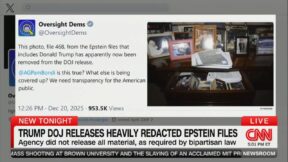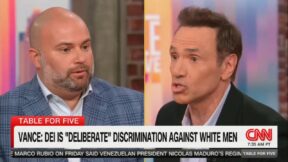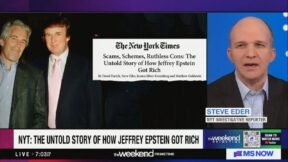NPR Veteran Takes Sledgehammer to His Current Employer’s Creeping Liberal Bias

Uri Berliner has worked at National Public Radio for 25 years. He graduated from Columbia School of Journalism, and also attended Harvard University as a Nieman Fellow. He’s won a Peabody Award, a Loeb Award, an Edward R. Murrow Award. None of these accolades, however, will earn him the attention of his latest foray: taking a sledgehammer to his own employer in a scathing piece written for The Free Press.
Berliner currently — yes, currently — serves as senior business editor for NPR, which he criticized in blunt terms for its lurch towards what he describes as an illiberal position of progressive dogma. He did so in a piece published by The Free Press, a site founded by another critic of the liberal leanings of America’s major news institutions, Bari Weiss.
While accusing NPR of having “lost America’s trust,” he writes:
An open-minded spirit no longer exists within NPR, and now, predictably, we don’t have an audience that reflects America.
That wouldn’t be a problem for an openly polemical news outlet serving a niche audience. But for NPR, which purports to consider all things, it’s devastating both for its journalism and its business model.
What follows is a damning critique of just how NPR lost its way — which resonated with me because, from my senior year in college until around 15 years ago I was an obsessive NPR enthusiast. I can make all the Kai Ryssdal, Netta Ulaby, and BJ Liederman jokes you want to show my bona fides, but sometime —a little more than a decade ago — I noticed a significant shift in tone and story coverage on public radio.
At first, it felt like self-parody, as if story selections were being made as part of an SNL skit written and designed to mock NPR. I recall an intro to a story entitled “The Secret Life of Plants.” Then, stories trended from absurd to partisan. Lately, much of NPR’s coverage seems rooted in an identity-based narrative designed to hang a lantern on courage and resilience, but too often and when told on repeat, it feels like a larger accusation that nearly everyone is a victim.
Berliner places the shift of the editorial point of view on the shoulders of Donald Trump, writing:
Like many unfortunate things, the rise of advocacy took off with Donald Trump. As in many newsrooms, his election in 2016 was greeted at NPR with a mixture of disbelief, anger, and despair. (Just to note, I eagerly voted against Trump twice but felt we were obliged to cover him fairly.) But what began as tough, straightforward coverage of a belligerent, truth-impaired president veered toward efforts to damage or topple Trump’s presidency.
Berliner bolsters his argument by criticizing NPR’s coverage of the Trump campaign’s alleged coordination with Russian intelligence officers and the dismissal of the Hunter Biden laptop story, sounding very much like a conservative media pundit who’s gliding over some well-accepted facts to make a bigger point. Perhaps we can explain away these partisan points as a side-effect of Berliner writing for Weiss’s audience, which has lately come to crave this kind of red meat.
Berliner goes on to explain that the real tipping point was the reckoning that followed George Floyd’s murder — and NPR CEO John Lansing’s reaction:
“When it comes to identifying and ending systemic racism,” Lansing wrote in a companywide article, “we can be agents of change. Listening and deep reflection are necessary but not enough. They must be followed by constructive and meaningful steps forward. I will hold myself accountable for this.”
And we were told that NPR itself was part of the problem. In confessional language he said the leaders of public media, “starting with me—must be aware of how we ourselves have benefited from white privilege in our careers. We must understand the unconscious bias we bring to our work and interactions. And we must commit ourselves—body and soul—to profound changes in ourselves and our institutions.”
He declared that diversity—on our staff and in our audience—was the overriding mission, the “North Star” of the organization. Phrases like “that’s part of the North Star” became part of meetings and more casual conversation.
There’s no question that Floyd’s killing prompted everyone in the media to took take a hard look into the mirror. Few places handled the reckoning as intensely as NPR.
Look, I will agree that the world has been unjust for many people for a long time, and the pendulum of justice never swings back and stops dead in the center. But the content curation at NPR seems to suggest that privileged demographics and their victims are all that truly matters anymore. As a result, there is a near-constant insistence on how listeners should lead their lives that has grown beyond tiresome.
Berliner, from his perch as a current editor at the public radio behemoth, goes deep into the current editorial process and lays out how diversity and inclusion are overriding principles — as if long-time listeners who think critically haven’t already noticed that. He writes:
There’s an unspoken consensus about the stories we should pursue and how they should be framed. It’s frictionless—one story after another about instances of supposed racism, transphobia, signs of the climate apocalypse, Israel doing something bad, and the dire threat of Republican policies. It’s almost like an assembly line.
The mindset prevails in choices about language. In a document called NPR Transgender Coverage Guidance—disseminated by news management—we’re asked to avoid the term biological sex. (The editorial guidance was prepared with the help of a former staffer of the National Center for Transgender Equality.) The mindset animates bizarre stories—on how The Beatles and bird names are racially problematic, and others that are alarmingly divisive; justifying looting, with claims that fears about crime are racist; and suggesting that Asian Americans who oppose affirmative action have been manipulated by white conservatives.
He follows this by noting a significant diversity problem at NPR: zero employees who responded to a survey he conducted identify as Republican. When he alerted others to the groupthink on display, he was met with indifference, as if the very term “diversity” had been reclaimed from a variety of thoughts and identities to something else entirely.
In addition to the column excerpted above, Berliner spoke for nearly 50 minutes with Weiss on her podcast, and while I certainly don’t agree with every word he and his host said, he came across as an entirely reasonable and dispassionate voice, which seems increasingly rare in a media world that opts to amplify extremes, dividing us along the way.
This is an opinion piece. The views expressed in this article are those of just the author.





Comments
↓ Scroll down for comments ↓